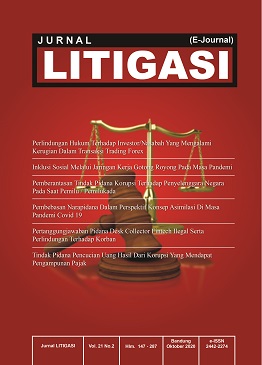PEMBEBASAN NARAPIDANA DALAM PERSPEKTIF KONSEP ASIMILASI DI MASA PANDEMI COVID 19
DOI:
https://doi.org/10.23969/litigasi.v21i2.3105Abstract
The Second Principle of Pancasila stating "just and civilized humanity", ensuring that Indonesian people are treated fairly and in a civilized manner despite their status as convicted felon. In addition, in the fifth principle, it is stated that "social justice for all Indonesian people" means that even as a prisoner, they are entitled to get their rights just like normal human life. During the Covid-19 pandemic, the government issued a policy of releasing prisoners through an assimilation program. With this policy, the public is worried that convicts who are released will commit crimes again. Based on this background, the problem is how the concept of assimilation is viewed from the perspective of criminal theory and whether the assimilation policy during the Covid-19 pandemic is in accordance with the concept of assimilation. In analyzing, the normative juridical method using the statue method of approach is used. The types of legal materials used are primary legal materials in the form of related laws and regulations and secondary legal materials in the form of books and scientific articles. Based on the results of the research, it shows that the concept of assimilation viewed from the perspective of integrative theory of sentencing is considered inappropriate because the purpose of punishment is to maintain legal order in society and improve the personality of the perpetrator while still paying attention to human rights (HAM) compared to imprisonment which causes more negative impacts and The assimilation policy during the Covi-19 pandemic was in accordance with the concept of assimilation, namely by fulfilling the requirements and conditions as stipulated in the laws and regulations, but researchers argue that the policy should be accompanied by reconstruction and / or reformulation related to the criminal system through the application of social work criminal sanctions as well as prevention and overcoming of crime through restorative justice.
Keywords: Assimilation, Covid-19, Law enforcement.
Downloads
References
Adami, Chazawi. 2010. Pelajaran Hukum Pidana. Jakarta: Raja Grafindo.
Amiruddin, and Asikin Zainal. 2003. Pengantar Penelitian Hukum. Jakarta: Raja Grafindo.
Ansori, Mohammad Hasan. 2020. “6. Asesmen Dan Mitigasi Konflik Di Tengah Pandemi COVID-19 Di Indonesia.” The Habibie Center THC Insights, no. 16: 2. www.habibiecenter.or.id.
Anwar, Mohamad. 2020. “Asimilasi Dan Peningkatan Kriminalitas Di Tengah Pembatasan Sosial Berskala Besar Pandemi Corona.” ’Adalah; Buletin Hukum Dan Keadialan 4: 101–6. http://journal.uinjkt.ac.id/index.php/adalah/article/view/15504/7263.
Dwiatmodjo, Haryanto. 2013. “PELAKSANAAN PIDANA DAN PEMBINAAN NARAPIDANA TINDAK PIDANA NARKOTIKA (Studi Terhadap Pembinaan Narapidana Di Lembaga Pemasyarakatan Narkotika Klas IIA Yogyakarta).” Perspektif 18 (2): 64. https://doi.org/10.30742/perspektif.v18i2.115.
Dwidja, Priyanto. 2009. Sistem Pelaksanaan Pidana Penjara Di Indonesia. Bandung: Refika Aditama.
Fajriando, Hakki. 2019. “Evaluasi Pelaksanaan Community-Based Corrections Di Lapas Terbuka Kelas III Rumbai” 13 (3): 326.
Hadjon, Philipus M. 1987. Perlindungan Hukum Bagi Rakyat Indonesia. Surabaya: Bina Ilmu.
Haryono, Haryono. 2018. “Optimalisasi Pelaksanaan Tugas Dan Fungsi Lapas Terbuka Dalam Proses Asimilasi Narapidana.” Jurnal Ilmiah Kebijakan Hukum 12 (3): 295. https://doi.org/10.30641/kebijakan.2018.v12.295-311.
Hidayat, Risyal Hardiyanto. 2020. “Langkah-Langkah Strategis Untuk Mencegah Pandemi Covid-19 Di Lembaga Pemassyarakatan Indonesia.” Jurnal Pendidikan Kesehatan 9 (1): 43–55.
Jufri, Ely Alawiyah. 2017. “Pelaksanaan Asimilasi Narapidana Di Lembaga Pemasyarakatan Terbuka Jakarta.” Jurnal Hukum Adil Vol.8 (1): 1–26.
Junhaedil, Samosir, Alvi Syahrin, Mahmud Mulyadi, and Jusmadi Sikumbang. 2017. “Implementasi Asimilasi Kerja Sosial Narapidana Korupsi Di Lembaga Sosial Sebagai Upaya Reintegrasi Sosial.” USU Law Journal 5 (2).
Kurnianingrum, Trias Palupi. 2020. “Kontroversi Pembebasan Narapidana Di Tengah Pandemi Covid-19.” Kajian Singkat Terhadap Isu Aktual Dan Strategis XII No.8 (April): 4–5.
Laden, Marpaung. 2009. Asas-Teori-Praktek Hukum Pidana. Jakarta: Sinar Grafika.
Mahmud, Ade. 2020. “Polemik Napi Di Tengah Pandemi.” Pikiran Rakyat, April 22, 2020.
Maidi Satria, Mohd. 2015. “Hak Asimilasi Narapidana Tindak Pidana Korupsi Dalam Sistem Pemasyarakatan .” Jurnal Ilmu Hukum 3 (1): 47–54. http://www.jurnal.unsyiah.ac.id/MIH/article/view/4760/4109.
Muladi, and Barda Nawawi Arief. 2002. Bunga Rampai Kebijakan Hukum Pidana. Bandung: Citra Aditya Bakti.
Sholehuddin, M. 2003. Sistem Sanksi Dalam Hukum Pidana. Jakarta: Rajawali Press.
Soekanto, Soerjono, and Sri Mamuji. 1990. Penelitian Hukum Normatif. Jakarta: Rajawali Press.
Suharsimi, Arikunto. 2002. Prosedur Penelitian. Jakarta: Rineka Cipta.
Surakhmad, Winarmo. 1998. Penantar Penelitian Ilmiah Dasar. Bandung: Tarsito.
Sutrisno, Hadi. 1989. Metodologi Riset. Yogyakarta: Fakultas Psikologi UGM.
Teguh, Prasetyo, and Barkatullah Abdul Halim. 2005. Politik Hukum Pidana. Yogyakarta: Pustaka Pelajar.
Wartaekonomi. 2000. “No.” Warta Ekonomi. 2000.
Yeni Widowaty. 2012. “Pertanggungjawaban Pidana Korporasi Terhadap Korban Dalam Kasus Tindak Pidana Lingkungan Hidup.” Jurnal Yudisial 5 (2): 154–69. https://jurnal.komisiyudisial.go.id/index.php/jy/article/view/152.
Yunus, Nur Rohim. 2020. “Kebijakan Covid-19 , Bebaskan Narapidana Dan.” ADALAH Buletin Hukum & Keadilan 4 (1): 1–6.
Additional Files
Submitted
Accepted
Published
Issue
Section
License
Copyright © 2025 Jurnal LITIGASI (e-Journal).
Jurnal LITIGASI (e-Journal) adopts the CC-BY license as the optimal license for publishing, distributing, using, and reusing scholarly work. Authors who publish with this journal retain copyright and grant the journal right of first publication with the work simultaneously licensed under a Creative Commons Attribution 4.0 International License (CC-BY 4.0). This license allows others to share, copy, distribute, and adapt the work, provided that the work's authorship and initial publication in this journal are properly cited.































